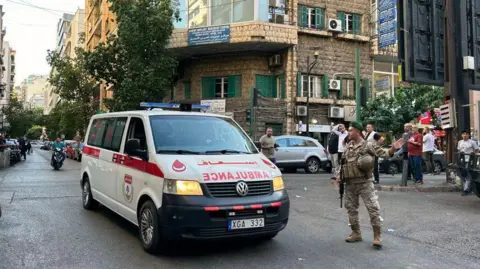Hezbollah pagers: How did they explode and who is responsible?

Thousands of people have been injured in Lebanon, after pagers used by the armed group Hezbollah to communicate dramatically exploded almost simultaneously across the country on Tuesday.
At least nine people were killed and some 2,800 injured, many of them seriously.
It is unclear how the attack – which looks to have been highly sophisticated – occurred, though Hezbollah has blamed its adversary Israel. Israeli officials have so far declined to comment.
Here is what we know so far.
When and where did it happen?
The blasts began in Lebanon’s capital Beirut and several other areas of the country at about 15:45 local time (13:45 BST) on Tuesday.
Witnesses reported seeing smoke coming from people’s pockets, before seeing small explosions that sounded like fireworks and gunshots.
In one clip, CCTV footage appeared to show an explosion in a man’s trouser pocket as he stood at a shop till.
Citing US officials, the New York Times said that the pagers received messages that appeared to be coming from Hezbollah’s leadership before detonating. The messages instead appeared to trigger the devices, the outlet reported.
Explosions continued for around an hour after the initial blasts, the Reuters news agency reported.
Soon after, scores of people began arriving at hospitals across Lebanon, with witnesses reporting scenes of mass confusion.
How did the pagers explode?
Analysts have been quick to express shock at the scale of Tuesday’s attack – saying Hezbollah prides itself on its security measures.
Some suggested a hack may have caused the pager batteries to overheat, causing the devices to explode. Such an act would be unprecedented.
But many experts say that is unlikely, with footage of the explosions inconsistent with the batteries overheating.
Some analysts say instead that some sort of supply chain attack, which involved the pagers being tampered with during their manufacture or in transit, was more likely.
Supply chain attacks are a growing concern in the cyber-security world with many high-profile incidents recently caused by hackers gaining access to products while they are in development.
But these attacks are normally contained to software. Hardware supply chain attacks are far rarer as they involve getting hands on to the device.
If this was indeed a supply chain attack it would have involved a huge operation to secretly tamper with the pagers in some way.
Security officials in Lebanon say that the pagers were packed with a small amount of explosives months before the devices entered the country. Speaking to the BBC, one ex-British Army munitions expert, who asked not to be named, speculated that the devices could have then been triggered by a remote signal.
 Getty Images
Getty ImagesWhat is known about the victims?
A source close to Hezbollah told AFP that two of those killed were the sons of two Hezbollah MPs. They also said the daughter of a Hezbollah member was killed.
Among the injured was Iran’s ambassador to Lebanon, Mojtaba Amani. Reports in Iranian media said his injuries were minor.
Hezbollah chief Hassan Nasrallah was not hurt in the explosions, Reuters reported quoting a source.
Lebanese Public Health Minister Firass Abiad said damage to the hands and face made up the majority of injuries.
Speaking to the BBC’s Newshour programme, he said: “Most of the injuries appear to be to the face and especially to the eyes and also the hand with some amputations, whether it’s in the hands or the fingers, and some of them have injuries to their flank.”
He added: “The vast majority of the people who are presenting to the emergency rooms are in civilian clothes, so it’s very difficult to discern whether they belong to a certain entity like Hezbollah or others…
“But we are seeing among them people who are old or people who are very young, like the child who unfortunately died… and there are some of them who are healthcare workers,” the minister said.
Outside of Lebanon, 14 people were injured in similar blasts in neighbouring Syria, according to UK-based campaign group the Syrian Observatory for Human Rights.
Who is responsible?
So far, nobody has claimed responsibility – though Lebanon’s prime minister and Hezbollah have blamed Israel.
Prime Minister Najib Mikati said the explosions represented a “serious violation of Lebanese sovereignty and a crime by all standards”. A security source in the country accused the Israeli intelligence agency Mossad of being behind the attack, Reuters reported.
In its statement accusing Israel of being behind the attacks, Hezbollah said it held the country “fully responsible for this criminal aggression that also targeted civilians”.
“This treacherous and criminal enemy will certainly receive its just punishment for this sinful aggression, whether it expects it or not,” it added.
Unnamed US and Israeli officials told Axios that the explosions were initially planned as the opening move in an “all-out” offensive against Hezbollah. But in recent days Israel became concerned Hezbollah had become aware of the plan – so they were detonated early.
Israeli officials have not commented on the allegations, but most analysts agree that it seems likely it is behind the attack.
Prof Simon Mabon, chair in International Relations at Lancaster University, told the BBC: “We know that Israel has a precedent of using technology to track its target” – but he called the scale of this attack “unprecedented”.
Lina Khatib, from the UK-based Chatham House, said the attack suggested that Israel has “deeply” infiltrated Hezbollah’s “communications network”.
 EPA
EPAWhy does Hezbollah use pagers?
Hezbollah has relied heavily on pagers as a low-tech means of communications to try to evade location-tracking by Israel.
A pager is a wireless telecommunications device that receives and displays alphanumeric or voice messages.
Mobile phones have long since been abandoned as simply too vulnerable, as Israel’s assassination of the Hamas bomb-maker Yahya Ayyash demonstrated as long ago as 1996, when his phone exploded in his hand.
But one Hezbollah operative told the AP news agency that the pagers were a new brand that the group had not used before. A Lebanese security official told the Reuters news agency that around 5,000 pagers were brought into the country about five months ago.
Labels seen on fragments of exploded pagers point to a pager model called the Rugged Pager AR-924. But Taiwanese manufacturer Gold Apollo has denied any involvement with the explosions. The founder, Hsu Ching-Kuang, said his company had signed an agreement with a European based company to manufacture the devices and use his company name.
When the BBC visited Gold Apollo on Wednesday local police were swarming the company’s offices, inspecting documents and questioning staff.
Emily Harding, an ex-analyst with the CIA, said the security breach was deeply embarrassing to Hezbollah.
“A breach of this magnitude is not only physically harmful, but will also make them question their entire security apparatus,” she told the BBC.
“I would expect to see them conduct an intensive internal investigation that will distract them from a potential fight with Israel.”
Will the Hezbollah-Israel conflict escalate?
Hezbollah is allied with Israel’s arch-nemesis in the region, Iran. The group is part of Tehran’s Axis of Resistance and has been engaged in a low-level war with Israel for months, frequently exchanging rocket and missile fire across Israel’s northern border. Entire communities have been displaced from both sides.
The blasts came just hours after Israel’s security cabinet made the safe return of residents to the north of the country an official war goal.
Prime Minister Benjamin Netanyahu told a visiting US official that Israel would “do what is necessary to ensure its security”.
Earlier on Monday, Israel’s domestic security agency said it had thwarted a Hezbollah attempt to assassinate a former official.
Despite the ongoing tensions, observers say that until now both sides have aimed to contain hostilities without crossing the line into full-scale war. But there are fears that the situation could spiral out of control, with Hezbollah already threatening to respond to Tuesday’s explosions.
Additional reporting by Frances Mao










